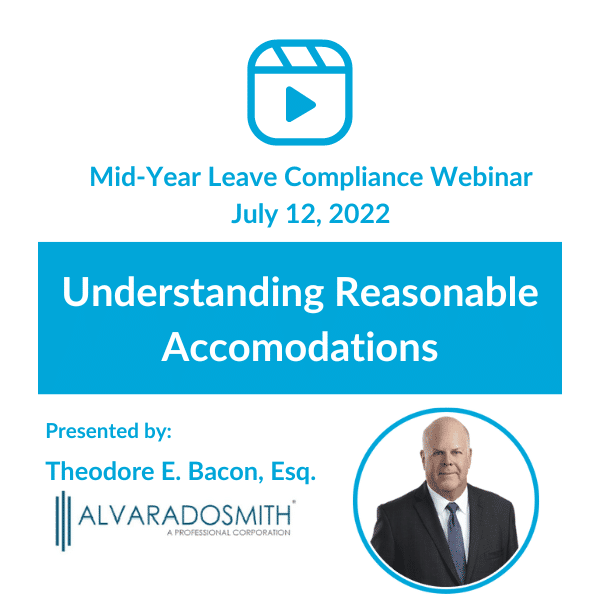Search for topics or resources
Enter your search below and hit enter or click the search icon.
June 24th, 2022 | 2 min. read
![[Webinar] 2022 Mid-Year Compliance Check-In](https://www.combinedhcm.com/hubfs/%5BWebinar%5D%202022%20Mid-Year%20Compliance%20Check-In.jpg)
Whether your company is big or small, a startup or mature, maintaining compliance in HR is critical to success. It is essential for employers to understand the intricacies of disability regulations and the importance of following a good-faith interactive process when dealing with employees who have disabilities.
In this recorded webinar, Ted Bacon, Chair of the Employment Law Practice Group at Alvarado Smith, delves into these crucial topics and provides valuable insights for employers. One of the key aspects discussed is the definition of "disability." Understanding this definition is vital as it sets the foundation for complying with disability regulations.
Disability regulations, another significant topic covered in the webinar, outline the legal requirements that employers must adhere to when it comes to accommodating employees with disabilities. Ted Bacon provides clarity on the good-faith interactive process that employers should engage in to determine what reasonable accommodations can be made for disabled employees.
Making reasonable accommodation is an essential aspect of maintaining compliance in HR. It involves considering and implementing modifications or adjustments to the work environment, job duties, or policies to ensure employees with disabilities can perform their roles effectively. By providing reasonable accommodation, employers promote inclusivity and create an environment where all employees can thrive.
However, there may be situations where making accommodations for disabled employees may pose undue hardship on the company. In such cases, employers can explore the undue hardship defense, which exempts them from making certain accommodations. Understanding the boundaries and limitations of this defense is crucial for employers when navigating compliance in HR.
To help employers avoid common pitfalls, Ted Bacon highlights common mistakes made by employers regarding disability accommodations. By learning from these mistakes, employers can enhance their compliance efforts and create a more inclusive and supportive work environment for all employees.
In addition to discussing potential pitfalls, the webinar also provides best practices for employers to follow when it comes to disability accommodations. These best practices serve as a guide for employers to ensure they are proactive, fair, and compliant in their approach to accommodating employees with disabilities. By implementing these practices, employers can foster a culture of inclusivity and promote the well-being of their workforce.
Maintaining compliance in HR is not just a legal requirement; it is a reflection of an organization's commitment to creating an inclusive and equitable workplace. By staying informed and following best practices, employers can navigate the complexities of disability accommodations with confidence, ensuring the success and well-being of their workforce.
Defined "disability"
Lawyer, Shareholder at AlvaradoSmith APC
The Managing Shareholder of the San Francisco office, Ted Bacon has successfully helped clients resolve a variety of disputes, including all types of employment and business related matters, such as wrongful termination claims, discrimination and harassment claims, wage and hour class actions and PAGA (Private Attorneys General Act) claims, trade secrets and unfair competition, fraud and wrongful foreclosure, unfair business practices, breach of contracts and corporate and partnership disputes.
His experience as a seasoned trial lawyer has given him the ability to advise clients on what they need to know and do to minimize the chances of claims, and to maximize the chances for positive results if suits are led. He has taken dozens of cases to jury verdict and many more to judgment by court trial, and has negotiated hundreds of very favorable settlements for his clients.

Topics: